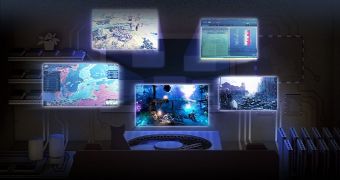If you were to ask a gamer just three years ago if they could imagine Linux burying the next-gen console, they would have said that it was impossible and everyone would have had to agree.
Only a few years ago, users could not even imagine the kind of power that Linux was hiding under the hood. Everyone knew for a long time that Linux had no real rival in the server market. On the other hand, the gaming market has been dominated by Windows for a long time and the consoles have been eating away at the PC share for a few years
Things appeared to be set in stone. The PC market was declining slowly, the consoles were starting to get the high ground, and two forces stayed hidden in the shadows, Linux and Valve. No one could have predicted this unlikely partnership, and no executive from one of the major players like Microsoft or Sony saw the threat.
About a year ago everything changed. Valve announced Steam for Linux and suddenly, almost overnight, the Linux gamers went from having just a bunch of games (most of them free and most of them ugly) to getting new games almost on a daily basis.
What happened? Well, in the course of just one year, developers started to port their games for the Linux platform, Valve began to bring all its games for the Linux players, Unity (gaming engine) got Linux support, Unigine (another gaming engine) got Linux support, Epic launched the new Unreal engine with Linux support, Crytek is preparing CryENGINE fro the Linux platform, NVIDIA is porting Physics, AMD and DICE are doing Mantle (Linux compatible most likely), and this is just the tip of the iceberg.
Valve did another interesting thing. It released a new operating system based on Debian called SteamOS that would be used to power a new generation of PC / consoles hybrids called Steam Machines.
The hardware specs of the new console are already over anything the consoles can provide, but they are a little bit too expensive. This is normal with new products and the prices will go down.
If all of this was accomplished in just one year, it's very likely that the Steam Machines will most likely get a foothold in many homes in about two or three years. By the time other companies like Microsoft and Sony will think about releasing maybe another set of “next-gen” consoles, it will be too late.
And what will people have running in their living rooms? A console with upgradeable parts running SteamOS, which is in fact a Debian Linux distribution. It might have been difficult to imagine just a couple of years ago, but now it seems to be the natural evolution.
This is the end of the next-gen consoles as you know it. There won't be anything after them. If you already have one, take a good look at it and imagine it's like a retiree that has been working for too long, and now you have just hired him as a twenty-year-old in his prime.
If may not be obvious just yet, but Linux is here to stay, in one form or another, and consoles are slowly getting out the door, slipping silently into history.

 14 DAY TRIAL //
14 DAY TRIAL //